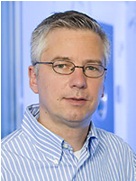 Walter Leitner is a full Professor at Technische Chemie und Petrolchemie, Institut für Technische Chemie und Makromolekulare Chemie at the RWTH Aachen University and is the new Chair of the Green Chemistry Editorial Board. As Walter takes up his new position, we asked for his thoughts on how sees the Journal, and the area of green chemistry, developing in the future…
Walter Leitner is a full Professor at Technische Chemie und Petrolchemie, Institut für Technische Chemie und Makromolekulare Chemie at the RWTH Aachen University and is the new Chair of the Green Chemistry Editorial Board. As Walter takes up his new position, we asked for his thoughts on how sees the Journal, and the area of green chemistry, developing in the future…
Who or what initially inspired you to become a chemist?
I cannot fix this to a single person or event. To be honest, a large number of coincidences and external factors led me to study chemistry at Regensburg University, and it was mostly during my time as PhD-student with Henri Brunner and PostDoc with John Brown that I developed a strong research interest into catalysis and organometallic chemistry – and started to become fascinated by the idea of academic freedom!
You’ve recently been appointed as the new Chair of the Green Chemistry Editorial Board – what most excites you about the Journal?
The ever increasing scientific quality of the contributions and the incredible enthusiasm of the community – just coming back from the Green Chemistry Gordon Conference near Lucca in Italy, I am still nurtured by the same experience there!
Where would you like to see the Journal develop during your time as Chair?
With its strong roots in green synthetic organic chemistry, the journal has enormous potential to further expand also into areas such as biomass conversion, green reaction engineering, and materials from and for sustainable processes. It has reached a top position within the general chemistry journals and I am convinced that there is still room for significant growth in scope AND impact at the same time.
Where do you see the area of green chemistry being in 5 or 10 years time?
It will continue to shape the landscape in education, science, and industrial practice – with increasing importance on the interface between chemistry and chemical engineering.
What advice would give to young scientists starting research in this field?
I am not sure whether I feel old enough to give such advice… If anything, I would say one might ask two questions: Do I enjoy what I am doing? And do I see enough challenges to keep me excited in the long term? – and don’t forget, science is done by people for people.
And finally…
If you could not be a scientist, but could be anything else, what would you be?
Oh my, there are too many things I could imagine! If I need to name only one: a musician in a Jazz/Soul band (if I could also ask for enough talent, too!).
Stay up-to-date with all the latest news from the Journal by registering for our free table of contents alerts.










